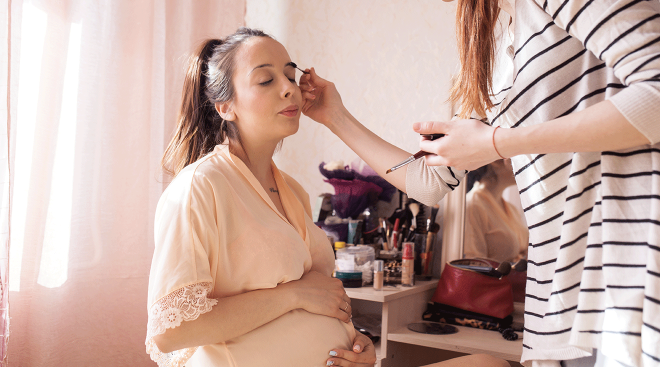- At this stage of your journey, you’re not actually pregnant yet. In fact, you probably have your period; the symptoms you’re experiencing are a result of PMS, not pregnancy.
- Now is the time to start prepping for pregnancy: Track your days to chart your cycle, begin taking a prenatal vitamin and make lifestyle changes to get ready for the long road ahead.
- Just got a positive pregnancy test? You’ll want to skip ahead. If you’ve tested around the time of a missed period, you’re probably actually about four weeks along (congrats!).
In doctor speak, one week pregnant means you’re on your period and not yet pregnant. You won’t actually conceive your baby until week two or three, depending on the length of your cycle.
If you’ve just found out you’re expecting, you might think this is your first week of pregnancy, but you’re probably around 4 weeks pregnant. Yes, already! (Your OB will give you a more accurate estimate when you go in for your first prenatal appointment.) Skip ahead and check out week 4.
How big is baby at 1 week?
Baby is but a glimmer in your eye. Remember you’re not actually pregnant yet—and if you are, you’re more likely about four or five weeks along.
1 week ultrasound
You’re not likely to have a 1 week pregnant ultrasound. But if you’ve been trying for a while to get pregnant and have seen a fertility specialist, you may have had an ultrasound to check for fibroids, to see how many follicles (which grow into eggs) are in your ovaries and/or to gauge the thickness of your uterine lining. If there are any problems, your doctor may prescribe a fertility treatment that can help you conceive. Now, get ready to have some sex. You’ve got a baby to make!
At one week pregnant—remember, at this early stage, the symptoms you're experiencing are those typical to your period because you're not actually pregnant. These symptoms may last from three to seven days and can include:
Vaginal bleeding
Your body is shedding the uterine lining, which was plumped up just in case of a pregnancy.
Lower back pain and cramps
To release that lining, your uterus contracts, causing your back and abdomen to ache.
Bloating
Fluctuating hormones can give you a bloated belly right before and during your period.
Mood swings
Those hormone surges can also cause irritability and wreak havoc on your emotions
Headache
Many women complain of menstrual migraines, which are also hormone-related. (Surprise, surprise.) Ice packs, OTC pain relievers and relaxation exercises may help ease the pain.
Inside your 1 week belly (remember, you’re not actually pregnant at this point), your body is releasing last month’s uterine lining and starting to form a new one, which (with a bit of luck!) will hold next month’s fertilized egg.
Cool fact: Human eggs are the largest cells in the body. An egg is smaller than a fleck of pepper. Your body will release one (or in rare cases, two) eggs somewhere between day 10 and day 19 of your menstrual cycle—or about 14 days before your next period is expected. It can be fertilized for about 12 to 24 hours after that. Having sex even before then is helpful, since sperm can live in your body for up to five days.
The first signs of pregnancy won’t occur right away—in fact, many women miss their period at week 4 before they begin to feel “different.” But some common early signs of pregnancy in the first weeks after fertilization include breast soreness or tenderness, nausea, fatigue and the frequent urge to pee.
At one week pregnant (aka hoping to be pregnant soon!), you’re probably thinking about how you can prep your body to carry a baby. It’s a good idea to start pregnancy at a healthy weight and free of bad habits such as smoking and drinking. Reduce your caffeine intake to the equivalent of a cup of coffee or two (we’re talking 8 ounce cups—not the Venti!) per day.
The first thing you’ll want to do is start a prenatal vitamin. Prenatal vitamins contain important vitamins and minerals to help support a healthy pregnancy. Second, we want to optimize trying to conceive. You can start by tracking your menstrual cycle and learning your fertile window. You can try using ovulation predictor kits to have a better understanding of when you’re ovulating to time intercourse. Also, make sure to pay attention to your lifestyle habits. Stop smoking and keep alcohol and caffeine to moderate consumption or less!
Stop unhealthy habits
Are you still smoking, drinking and taking in excessive amounts of caffeine? You don’t want to reactively stop doing these things after a positive pregnancy test. You should curb bad habits now before you're expecting.
Consider going for a preconception visit
If you haven’t seen your doctor in a while, you might consider scheduling a visit before you even attempt to get pregnant. It’s a great way to get the ball rolling and have all your pressing questions addressed and answered.
Try to relax
Pregnancy can be stressful. And trying to conceive may be stressful too. It’s easier said than done, but try not to sweat the small stuff while you’re getting started on this journey.
Frequently Asked Questions
What is basal body temperature and how can it help me conceive?
You’re probably used to taking your temperature when you feel feverish, but your basal body temperature (BBT) is different. This is the temperature of your body at rest. For most women, the body’s temperature increases slightly during ovulation (like, half a degree to a full degree), and then stays high until the end of your period. Your most fertile days are two to three days before your temperature increases.
To use this method to conceive, take your temperature every morning when you wake up and before you do anything, like get out of bed or have something to eat or drink. Write down your daily temperatures and look for a pattern in your cycle. This can help you plan out when to have strategic baby-making sex.
What should I look for in a prenatal vitamin?
Prenatal vitamins help ensure you’re getting all the nutrients you need during this time to support your health and baby’s development. It’s best to get these ingredients in your prenatal vitamins:
- Folic acid (600 micrograms)
- Iron (27 milligrams)
- Calcium (1,000 milligrams over the age of 19+)
- Vitamin D (600 international units)
- Choline (450 milligrams)
- Vitamin B6 (1.9 milligrams)
- Vitamin B12 (2.6 micrograms)
- Vitamin C (85 milligrams over the age of 19+)
- Vitamin A (750 micrograms for ages 14 to 18; 770 micrograms for ages 19+)
- Iodine (220 micrograms)
What exactly happens at a preconception visit?
There are a few things that happen at a preconception visit. For starters, this is a great chance to get to know a pregnancy care provider and start a relationship for the future. But it’s also a good chance to talk about your health going into pregnancy. That can mean discussing any medical conditions you have, medications you’re taking, your family history and genetic factors that may impact your pregnancy. Your healthcare provider will also likely talk about your vaccination and nutritional status.
This is a great time to chat through conception and any concerns or questions you have. Your ob-gyn or midwife will want to understand your menstrual cycles and any variations you may have, too. If your healthcare provider thinks it’s necessary, they may recommend that you have lab testing done.
What is an ovulation predictor kit?
An ovulation predictor kit is a handy tool that can help tell you when you’re ovulating—so you can try to increase the odds you’ll become pregnant during any given cycle. An ovulation predictor kit helps project the timing of ovulation by detecting a surge in luteinizing hormone (LH) that happens before you ovulate (i.e. when an egg is released from your ovaries). LH is a hormone produced by the pituitary gland, and its levels rise sharply about 24 to 36 hours before you ovulate. By detecting the LH surge, ovulation predictor kits can help determine when ovulation is likely to happen, allowing you to time sex to have the best chance of conceiving.
How can I distinguish between my period and implantation bleeding?
It can be tough to distinguish between your period and implantation bleeding, which is thought to happen when the fertilized egg attaches to the lining of the uterus. Still, there are some clues you might be dealing with one over the other. Implantation bleeding tends to be lighter and shorter than your usual period. It might look like light spotting or a pink/brown discharge, and it usually happens six to 12 days after you ovulate. Of course, if you’re not sure what’s going on down there, it’s worth taking a pregnancy test.
Getting pregnant isn't always as easy as your high school sex-ed teacher told you. For some of us it takes years. After three years of trying, several IUIs and IVF, we got to meet our beautiful daughter. IVF is a lot to wrap your head around, but the community of support continues to grow—and you're never alone!
Please note: The Bump and the materials and information it contains are not intended to, and do not constitute, medical or other health advice or diagnosis and should not be used as such. You should always consult with a qualified physician or health professional about your specific circumstances.
Alberts B, Johnson A, Lewis J, et al., Molecular Biology of the Cell. 4th edition, 2002
American Pregnancy Association, 1-2 Weeks Pregnant
American Pregnancy Association, [4 Weeks Pregnant(https://americanpregnancy.org/healthy-pregnancy/week-by-week/4-weeks-pregnant/))
American Pregnancy Association, What is Menstration?
US Centers for Disease Control and Prevention (CDC), Planning for Pregnancy., February 2023
Cleveland Clinic, Ovulation, July 2022
Cleveland Clinic, Menstral Cycle, December 2022
March of Dimes, Caffeine in Pregnancy, April 2020
Massachusetts Institute of Technology, Study Reveals How Egg Cells Get so Big, 2021
Mayo Clinic, [Fetal Development: The First Trimester], (https://www.mayoclinic.org/healthy-lifestyle/pregnancy-week-by-week/in-depth/prenatal-care/art-20045302),,) June 2022
Mayo Clinic, How Long Do Sperm Live After Ejaculation?, May 2022
Mayo Clinic, Prenatal Vitamins: Why they Matter, How to Choose, April 2022
MedLine Plus, Is the Probability of Having Twins Determined by Genetics?
New York-Presbyterian, Pregnancy Timeline Week by Week
Planned Parenthood, Month by Month
Planned Parenthood, What’s Up With Periods?
StatPearls, Sonography Gynecology Infertility Assessment, Protocols, and Interpretation, 2023
Learn how we ensure the accuracy of our content through our editorial and medical review process.
Navigate forward to interact with the calendar and select a date. Press the question mark key to get the keyboard shortcuts for changing dates.














































